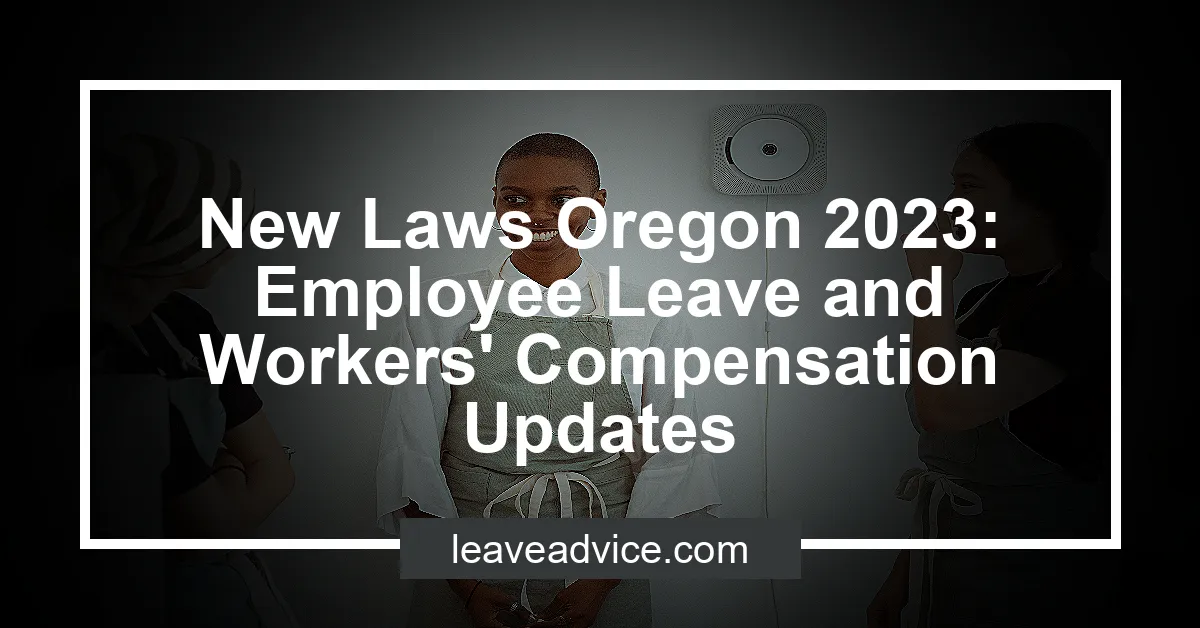New Laws Oregon 2023: Employee Leave and Workers’ Compensation Updates
Starting January 1, 2023, Oregon will be implementing 20 new laws that aim to improve public safety, worker protection, and promote equity within various aspects of employment in the state. These new laws have implications for both employees and employers across different industries.
New Laws Impacting Employee Rights
- Pay Equity: The state’s existing pay equity law will be expanded to cover all protected classes, broaden the scope of the requiring data employers must submit at the time of registration, and prohibit employers from screening job applicants based on their salary history.
- Paid Family Medical Leave: Starting January 1, 2023, all Oregon employees will be eligible for paid family and medical leave. Employees can take up to 12 weeks of paid leave per year for pregnancy, childbirth, serious health conditions, or family care.
- Right to Rest:Employees will have the right to uninterrupted rest and meal breaks after four hours of work.
Check out this YouTube video to learn how new laws in Oregon will impact employment, worker’s compensation, and leave management starting in 2023.
Don’t miss out on this informative video if you live or work in Oregon and want to stay up to date on important legal changes.
Employee Leave Laws
Starting January 1, 2023, Oregon will have new employee leave laws that all employers should be aware of. These laws are intended to support and protect employees who need to take time off from work for various reasons.
Below are some of the key laws:
- The Paid Family and Medical Leave Program: This program provides up to 12 weeks of paid leave for eligible employees who need to take time off to care for themselves, their family members, or new children. Employees and large employers with 25 or more employees are required to pay into the program, and self-employed people and independent contractors can opt-in.
- The Oregon Family Leave Act: This law requires employers to provide eligible employees with up to 12 weeks of unpaid leave in a 12-month period for certain family or medical reasons, such as the birth or adoption of a child, a serious health condition, or to care for a family member with a serious health condition.
- The Oregon Sick Time Law: This law requires employers to provide employees with up to 40 hours of paid sick time per year to use when they are ill, injured or need to care for themselves or a family member.
Make sure to familiarize yourself with these laws, as failure to comply could result in penalties and fines. Remember, taking care of employees should always be a top priority for employers.

The Paid Family and Medical Leave Program
Starting January 1, 2023, the Paid Family and Medical Leave Program will take effect in Oregon. This program is designed to provide employees with paid leave to care for themselves or family members during serious medical conditions, childbirth or adoption, and other qualifying events.
The Paid Family and Medical Leave Program also allows for job protection during the leave period, and continued health benefits coverage.
Employees and large employers with 25 or more employees will start paying into Paid Leave on January 1, 2023. Self-employed individuals and independent contractors can also choose to participate in this program.
This means that employees and self-employed individuals, who meet the eligibility requirements, can receive up to 12 weeks of paid leave per year.
This new law will have a significant impact on Oregon’s workforce, as it will allow workers to take paid leave for family or medical reasons without the fear of losing their jobs or health insurance benefits.
The Oregon Family Leave Act
Effective January 1, 2023, the Oregon Family Leave Act will undergo significant changes, expanding the amount of leave time covered and the categories of family members eligible for leave. Under the Family and Medical Leave Act (FMLA), eligible employees are entitled to up to 12 weeks of unpaid, job-protected leave per year, with the continuation of their group health benefits during leave.
However, with the introduction of the Family and Medical Leave Insurance (FAMLI) program, Oregon will become the eighth state providing paid leave to employees. Beginning in 2023, private employers with one or more Oregon employees will be required to provide up to 12 weeks of paid leave for qualifying events, including bonding with a new child, caring for a family member with a serious health condition, or the employee’s own health condition.
Additionally, starting in January 2023, employees and large employers with 25 or more employees will begin paying into the Paid Leave program, while self-employed individuals and independent contractors can opt into the program if they choose.
These new laws aim to provide increased support for employees and their families during times of need, while also boosting workplace productivity by reducing the stress and financial burden associated with taking unpaid leave.
The Oregon Sick Time Law
Starting from January 1, 2023, employees in Oregon will begin accruing sick leave from the first day of work, and they will be eligible to use accrued sick leave after the 91st day of employment. Employees will accrue one hour of sick leave for every 30 hours worked.
This new law is an expansion of the Oregon Sick Time Law and ensures that employees have access to paid time off for illness or medical appointments.
The Family and Medical Leave Act (FMLA) in Oregon
The enactment of FAMLI (Family and Medical Leave Insurance) in Oregon will provide employees with up to 12 weeks of paid leave within a 12-month period. This new law requires private employers with one or more employees within the state of Oregon to provide paid leave to their employees.
Effective January 1, 2023, eligible employees can take leave for the serious health condition of the employee or family members, bonding with a newborn or adopted child, and military exigency leave.
Introduction of Paid Leave in Oregon
Starting from January 1, 2023, employers with 25 or more employees will be required to contribute to paid leave in Oregon. Additionally, self-employed individuals and independent contractors can also choose to participate in the paid leave program.
This new law will help people take time off from work for reasons like sickness, recovery, or caregiving, without the added financial strain of losing pay.
Workers’ Compensation Updates
Oregon is introducing new workers’ compensation updates starting January 1, 2023. Below are some important changes to expect:
- Workers’ Compensation Premium Assessment: In 2023, the Oregon Department of Consumer and Business Services will calculate the premium assessment rate, which will be used to determine the amount of premium employers must pay for workers’ compensation insurance. To determine the new premium assessment rate, the department will consider factors like accident trends, loss cost trend, and other economic trends in the state.
- Workers’ Compensation Claim Process: The process of filing a workers’ compensation claim in Oregon is being updated to provide more support and resources to injured workers. Starting January 1, 2023, workers will be able to access a new online claim system and receive more frequent updates about their claim status.
- Workers’ Compensation Appeals Process: The appeals process for workers’ compensation claims is also being updated to improve efficiency and fairness. Starting in 2023, appeals will be handled by a centralized appeals board, and injured workers will have more options for legal representation during the appeals process.

The Workers’ Compensation Premium Assessment
Starting January 1, 2023, Oregon’s workers’ compensation laws will be updated to reflect new laws oregon 2023. These changes will include new fee schedules and assessments for employers, affecting both small and large businesses throughout the state.
Under these changes, businesses with 25 or more employees will be required to start paying into Paid Leave, which includes a paid family and medical leave program. Additionally, self-employed individuals and independent contractors will be able to choose to participate in Paid Leave.
This program provides qualifying employees with up to 12 weeks of paid leave per year.
Furthermore, starting on January 1, 2023, private employers with one or more employees in Oregon will be required to provide up to 12 weeks of paid leave within a 12-month period. This is under the Family and Medical Leave Act (FMLA), which provides certain employees with up to 12 weeks of unpaid, job-protected leave per year.
Employers will need to maintain group health benefits during the leave period.
Employers will also need to provide eligible employees with new sick leave benefits starting on January 1, 2023. Employees hired after this date will begin accruing sick leave on their first day of work and will be eligible to use accrued sick leave after the 91st day of employment.
Employees will accrue one hour of sick leave for every 30 hours worked.
It is important for businesses in Oregon to understand these new laws oregon 2023 and how they will impact their workers’ compensation premiums. The Workers’ Compensation Premium Assessment will be updated to reflect these changes, and businesses will need to adjust their budgets accordingly.
Employers should consult with a workers’ compensation lawyer for guidance on navigating these new regulations.
The Workers’ Compensation Claim Process
As of January 1, 2023, new laws regarding Workers’ Compensation have gone into effect in Oregon. Employers are now required to report any workplace injuries or illnesses as well as the employee’s name and social security number.
Large employers with 25 or more employees must now provide paid leave to their employees, and self-employed people and independent contractors are now eligible to participate in Paid Leave. Furthermore, FAMLI (Family and Medical Leave Act) has been enacted, requiring private employers with one or more employees within the state of Oregon to provide up to 12 weeks of paid leave within a 12-month period.
For those planning to file a Workers’ Compensation claim, there are 5 steps to follow. Firstly, the employee must report the injury to their employer.
Secondly, the injured worker must provide their employer with written notice of the injury, including the date, time, and place of the occurrence. Thirdly, the employer guides the injured worker on how to file a claim with its insurer or self-insured employer.
Fourthly, the claim is reviewed by the insurer or self-insured employer, and benefits are awarded or denied accordingly. Lastly, the claim can be taken to the Workers’ Compensation Board and, if necessary, the court system for dispute resolution.
New Laws Affecting Workers’ Compensation in Oregon 2023
Several new laws will go into effect on January 1, 2023, that will impact the Workers’ Compensation system in Oregon. One significant change is an update to the appeals process for Workers’ Compensation claims.
The Appeals Process
The new appeals process will provide expanded access to the Workers’ Compensation Board and establish new procedures for appealing decisions. Under the new law, appeals must be filed within 30 days of the filing date of the judge’s decision.
Doctors, pharmacies, and other medical service providers will also have the ability to appeal decisions related to their reimbursement and payment for services.
New Laws Affecting Paid Leave
Starting January 1, 2023, employees and large employers with 25 or more employees will pay into Paid Leave. Self-employed people and independent contractors will also have the option to participate in Paid Leave.
The Family and Medical Leave Act (FMLA) will now require private employers with one or more employees within the state of Oregon to provide up to 12 weeks of paid leave within a 12-month period. An important note is that this will now effectuate Oregon to be the 8th state to have a paid family and medical leave program.
Sick Leave Implementation
Employees hired after January 1, 2023, will begin accruing sick leave on the first day of work and will be eligible to use accrued sick leave after the 91st day of employment. Employees will accrue one hour of sick leave for every 30 hours worked.
COVID-19 Changes to Workers’ Compensation
The WCD COVID-19 processes have been updated through an industry notice as of March 17th, 2020. Temporary changes to OAR 436-009 have also been made, affecting “The Oregon Medical Fee and Payment Rules”.
Workers’ Compensation Calculation Factors
A closer look at Workers’ Compensation calculation factors highlights how changes in business payroll impact them. It is crucial for employers to understand these updates, as they may affect their Workers’ Compensation rates.
Filing a Workers’ Compensation Claim
There are five steps to filing a Workers’ Compensation claim, including:
- 1. The employee reports an injury to their employer
- 2. The employer guides the injured worker on filing a claim
- 3. The employer reports the injury to their insurance company
- 4. The insurance company investigates and accepts or denies the claim
- 5.
Frequently Asked Questions
What are the new employee leave laws in Oregon 2023 and how do they affect employers?
What changes have been made to the workers' compensation process in Oregon 2023?
How do the new laws in Oregon 2023 impact employees and employers?
Conclusion
Starting January 1, 2023, there will be significant changes to employment laws in Oregon. Large employers with 25 or more employees and self-employed people will start paying into Paid Leave.
Private employers with one or more employees will need to provide up to 12 weeks of paid leave within a 12-month period with the enactment of FAMLI. Employees hired after January 1, 2023, will begin accruing sick leave on their first day of work.
Appeals for workers’ compensation must be filed within 30 days of the judge’s decision. Workers’ Compensation Lawyers in Oregon can help employees navigate the new laws in Oregon 2023.
Employers must also post a new model notice poster at each work site and provide it electronically to remote workers. It is essential for both employees and employers to familiarize themselves with these new laws to ensure compliance and avoid penalties.

